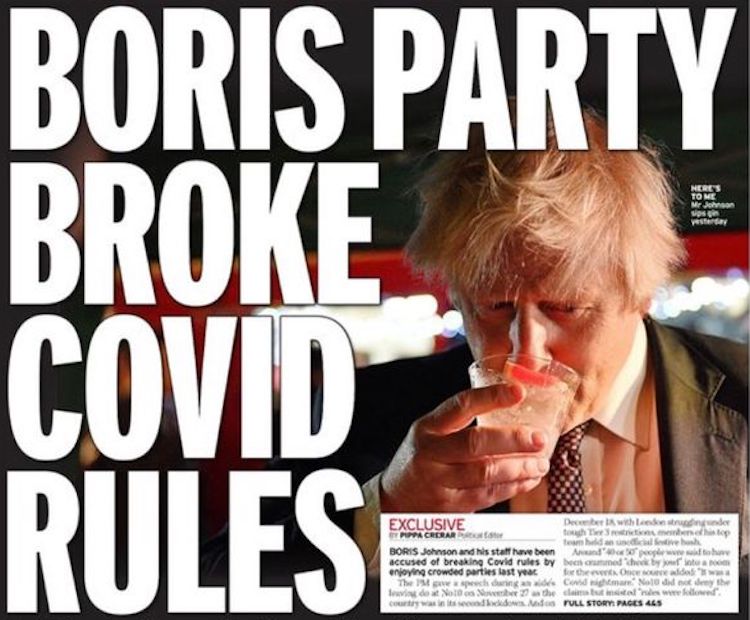
The UK parliament voted overwhelmingly yesterday to endorse an excoriating committee report into former prime minister Boris Johnson’s role in covering up the ‘partygate’ scandal. 354 MPs voted in favour of the report’s findings, and only seven voted against. Johnson resigned as an MP on 12th June, after receiving an advance copy of the report; in an unrepentant written statement, he denounced the committee as “the very definition of a kangaroo court.” (The partygate scandal was also one of the factors leading to Johnson’s resignation as prime minister last year.)
The House of Commons Committee of Privileges ruled that Johnson lied to parliament on multiple occasions. Their report states: “We conclude that in deliberately misleading the House Mr Johnson committed a serious contempt.” It goes on to say: “The contempt was all the more serious because it was committed by the Prime Minister, the most senior member of the government... He misled the House on an issue of the greatest importance to the House and to the public, and did so repeatedly.”
On 1st December 2021, the Daily Mirror published Pippa Crerar’s initial investigation into staff parties that took place at Downing Street during the coronavirus lockdown (headlined “BORIS PARTY BROKE COVID RULES”). On the same day that the story broke, Johnson denied that any lockdown rules had been broken, telling parliament that “all guidance was followed” in Downing Street. A week later, he told parliament: “I have been repeatedly assured since these allegations emerged that there was no party and that no Covid rules were broken”.
Many more details of raucous Downing Street parties later emerged, and more than a hundred attendees (including Johnson) were fined by the police, though Johnson maintained that the gatherings were justifiable work events. The House of Commons committee concluded that Johnson’s claim that he was misinformed by his staff was “no more than an artifice.” Their report also found that he lied under oath when he appeared before the committee: “He misled the Committee in the presentation of his evidence.”
The committee’s report argues that “[t]here is no precedent for a Prime Minister having been found to have deliberately misled the House”, though Johnson’s case is not completely unprecedented: during the Suez crisis, Anthony Eden also lied to parliament. On 20th December 1956, in a final speech before his resignation as PM, Eden told the House of Commons: “I want to say this on the question of foreknowledge, and to say it quite bluntly to the House, that there was not foreknowledge that Israel would attack Egypt — there was not.” It later emerged that the UK had indeed colluded with Israel and France to coordinate their invasion of Egypt.
The House of Commons Committee of Privileges ruled that Johnson lied to parliament on multiple occasions. Their report states: “We conclude that in deliberately misleading the House Mr Johnson committed a serious contempt.” It goes on to say: “The contempt was all the more serious because it was committed by the Prime Minister, the most senior member of the government... He misled the House on an issue of the greatest importance to the House and to the public, and did so repeatedly.”
On 1st December 2021, the Daily Mirror published Pippa Crerar’s initial investigation into staff parties that took place at Downing Street during the coronavirus lockdown (headlined “BORIS PARTY BROKE COVID RULES”). On the same day that the story broke, Johnson denied that any lockdown rules had been broken, telling parliament that “all guidance was followed” in Downing Street. A week later, he told parliament: “I have been repeatedly assured since these allegations emerged that there was no party and that no Covid rules were broken”.
Many more details of raucous Downing Street parties later emerged, and more than a hundred attendees (including Johnson) were fined by the police, though Johnson maintained that the gatherings were justifiable work events. The House of Commons committee concluded that Johnson’s claim that he was misinformed by his staff was “no more than an artifice.” Their report also found that he lied under oath when he appeared before the committee: “He misled the Committee in the presentation of his evidence.”
The committee’s report argues that “[t]here is no precedent for a Prime Minister having been found to have deliberately misled the House”, though Johnson’s case is not completely unprecedented: during the Suez crisis, Anthony Eden also lied to parliament. On 20th December 1956, in a final speech before his resignation as PM, Eden told the House of Commons: “I want to say this on the question of foreknowledge, and to say it quite bluntly to the House, that there was not foreknowledge that Israel would attack Egypt — there was not.” It later emerged that the UK had indeed colluded with Israel and France to coordinate their invasion of Egypt.
